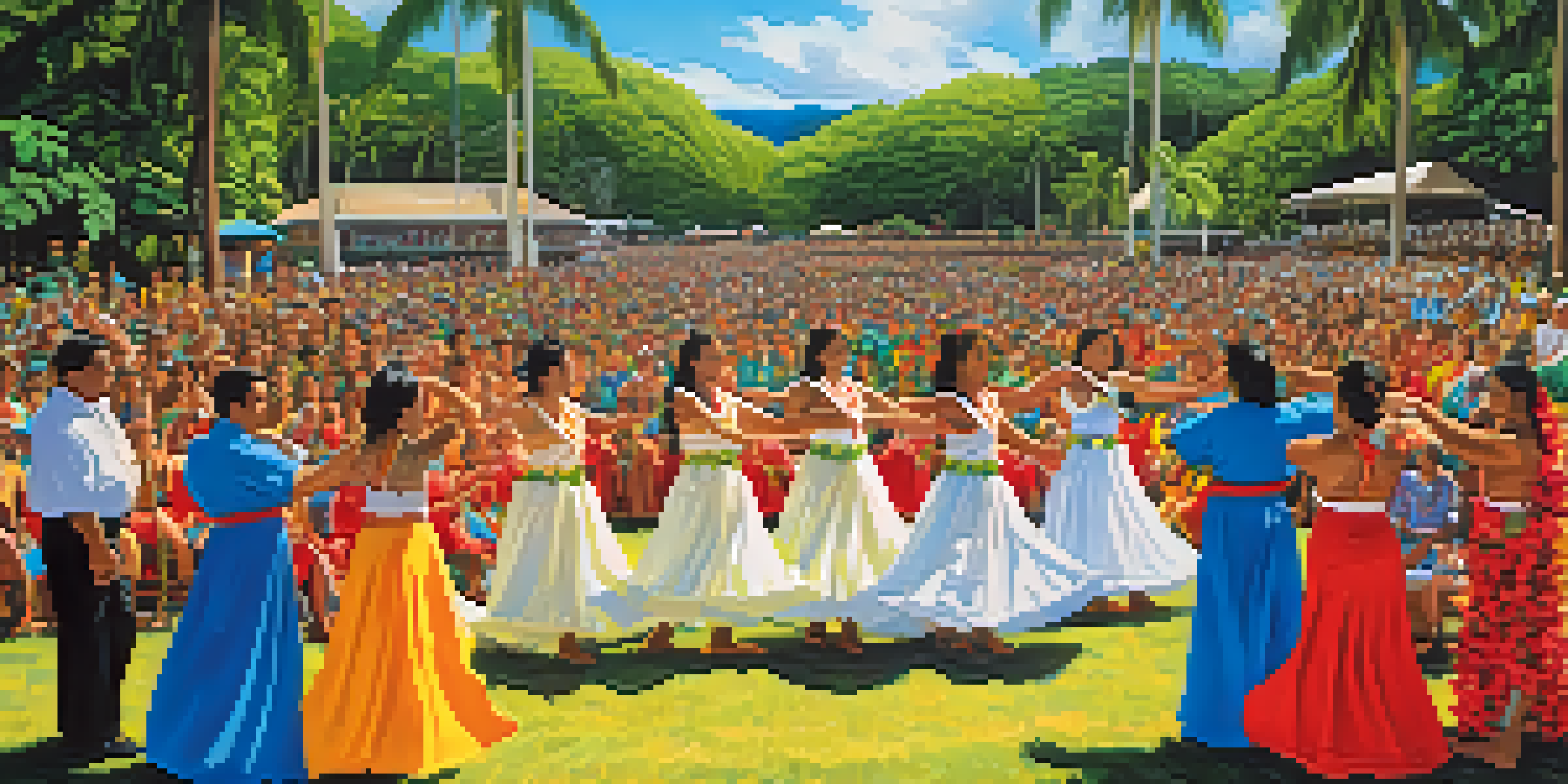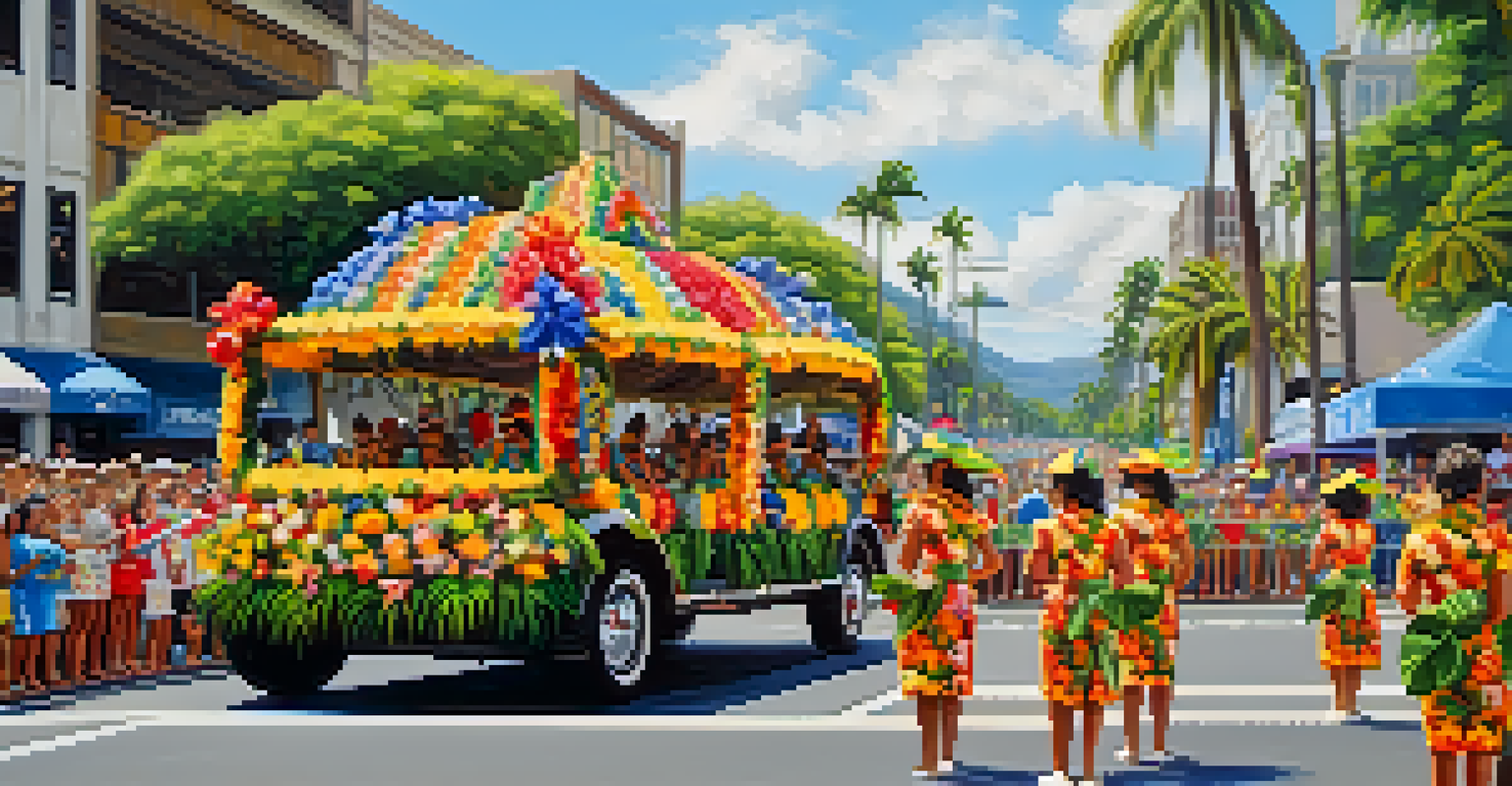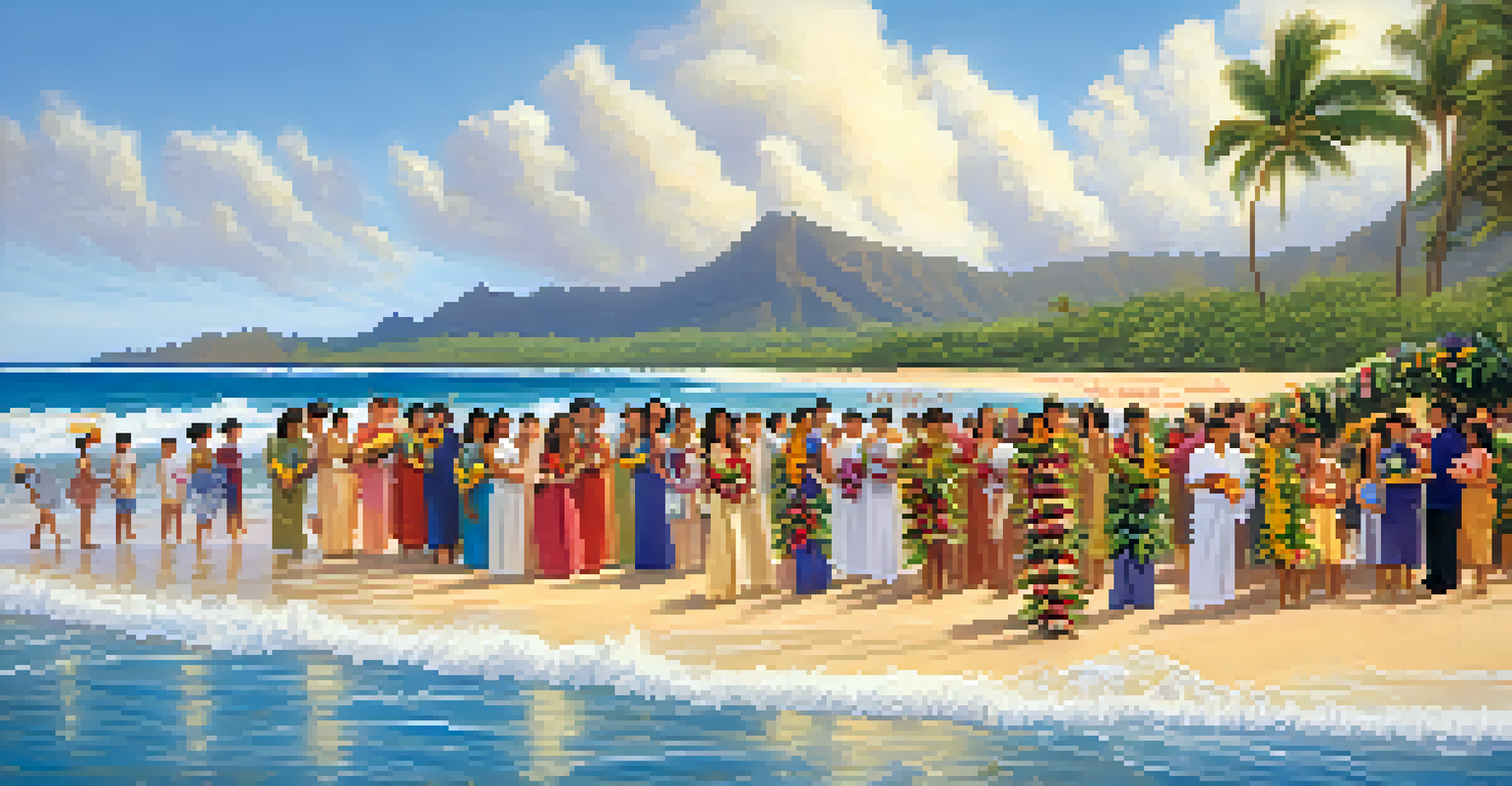Festivals of Hawaii: A Celebration of Cultural Diversity

Understanding the Aloha Spirit in Hawaiian Festivals
The Aloha Spirit is more than just a greeting; it embodies the essence of Hawaiian culture. It represents love, compassion, and a sense of community, which are central to many festivals across the islands. When you attend a festival in Hawaii, you're not just participating in events; you're experiencing the warm embrace of the Aloha Spirit.
The spirit of Aloha is the essence of relationships in which each person is important to every other person for collective existence.
Festivals like the Merrie Monarch Festival and the Aloha Festivals highlight this spirit by bringing people together to celebrate traditions. These events showcase hula, music, and art, reflecting the deep-rooted values of respect and unity. The connections made during these celebrations resonate with both locals and visitors alike.
In essence, the Aloha Spirit transforms festivals into vibrant gatherings that foster friendships and cultural appreciation. It reminds us that, regardless of our backgrounds, we can come together to celebrate diversity and shared humanity.
Merrie Monarch Festival: A Tribute to Hula and Hawaiian Culture
The Merrie Monarch Festival, held annually in Hilo, is the pinnacle of hula celebrations in Hawaii. Established in 1964, this week-long event honors King David Kalākaua, who revived hula as a cultural tradition. Attendees can witness breathtaking hula performances that vary from traditional to contemporary styles.

Aside from dance, the festival features a vibrant marketplace showcasing Hawaiian artisans, crafts, and food. This creates a platform for local artists to share their talent and promote Hawaiian culture. The festival's atmosphere is electric, filled with the sounds of music and the aromas of delicious local cuisine.
Aloha Spirit Unites Festivals
The Aloha Spirit embodies love and community, making Hawaiian festivals vibrant celebrations of culture and connection.
The Merrie Monarch Festival is not only a celebration of hula but also a deep dive into Hawaiian history and identity. It serves as a reminder of the resilience of Hawaiian culture and the importance of preserving these traditions for future generations.
Aloha Festivals: Celebrating Hawaii’s Unique Heritage
Aloha Festivals, celebrated in September, is Hawaii's largest festival, showcasing the islands' rich heritage. This month-long series of events includes parades, concerts, and cultural presentations, all embodying the spirit of Aloha. The festival highlights the uniqueness of each island, allowing visitors to experience diverse cultural expressions.
To be Hawaiian is not merely to be born in Hawaii, but to be part of a culture that embraces the spirit of community, love, and respect.
One of the most iconic events is the Floral Parade, where floats adorned with vibrant flowers showcase the beauty of Hawaii's flora. Participants often dress in traditional attire, creating a colorful display that reflects the islands' cultural diversity. The parade is a feast for the senses, bringing together locals and tourists in a celebration of unity.
Aloha Festivals encourage everyone to participate and learn about Hawaiian traditions, fostering a sense of pride and community. This celebration is not just about entertainment; it's a way to embrace and honor the rich tapestry of cultures that make Hawaii special.
Lei Day: Honoring the Symbol of Hawaiian Love and Friendship
Lei Day, celebrated on May 1st, is a beautiful tribute to the art of lei-making and its significance in Hawaiian culture. Leis are not just garlands; they symbolize love, friendship, and celebration. On this day, people across Hawaii create and wear leis, showcasing the creativity and diversity of floral arrangements.
Festivities include hula performances, musical entertainment, and lei-making contests, attracting participants of all ages. Each island has its own unique way of celebrating, from community gatherings to school events. This fosters a sense of togetherness, as everyone comes together to appreciate the beauty of leis.
Merrie Monarch Celebrates Hula
The Merrie Monarch Festival honors hula and Hawaiian culture, showcasing traditional performances and local artistry.
Lei Day serves as a reminder of the importance of sharing aloha through the simple act of giving and receiving leis. It reinforces the bonds of friendship and love that are central to Hawaiian culture, making it a cherished celebration for all.
Hawaiian International Billfish Tournament: A Sport Fishing Fiesta
The Hawaiian International Billfish Tournament (HIBT) is not just a fishing competition; it’s a vibrant celebration of sport, camaraderie, and the ocean. Established in 1959, this event attracts anglers from around the world, showcasing Hawaii’s rich fishing heritage. The tournament is held in August and spans several days filled with excitement and competition.
Participants gather in Kona, where they compete to catch the largest billfish, but the spirit of the tournament extends beyond fishing. It includes festive gatherings, award ceremonies, and a chance to connect with fellow fishing enthusiasts. This creates a lively atmosphere that celebrates the bond between people and the ocean.
HIBT highlights the importance of sustainable fishing practices while fostering a sense of community among participants. It’s a unique way to honor Hawaii’s maritime culture and promote conservation efforts, ensuring that future generations can enjoy the ocean just as much.
Kauai's Mokihana Festival: A Showcase of Cultural Arts
Kauai's Mokihana Festival is a delightful celebration of the island's cultural arts and heritage. This week-long event, held every September, features music, dance, and food, all highlighting the unique traditions of Kauai. It’s an opportunity for locals to showcase their talents and for visitors to immerse themselves in the rich cultural landscape of the island.
Workshops, performances, and cultural displays encourage community involvement and learning. From hula and chant to crafts and cuisine, participants can engage in hands-on experiences that deepen their understanding of Hawaiian culture. The festival fosters a sense of pride in the island’s heritage and promotes the importance of keeping these traditions alive.
Festivals Preserve Hawaiian Heritage
Hawaiian festivals play a crucial role in preserving cultural practices and traditions, ensuring they are passed down to future generations.
Mokihana Festival is a testament to Kauai’s commitment to preserving its cultural identity while welcoming others to share in the experience. It embodies the spirit of aloha and the celebration of diversity, making it a must-visit event for anyone on the island.
The Importance of Cultural Preservation Through Festivals
Festivals in Hawaii are not just about celebration; they play a crucial role in cultural preservation. By showcasing traditional practices, arts, and crafts, these events keep the rich history of Hawaii alive for future generations. They serve as a platform for education, fostering appreciation for the islands' unique heritage.
Many festivals include workshops and demonstrations led by local artisans, allowing attendees to learn directly from the source. This hands-on approach ensures that traditional skills and knowledge are passed down, creating a bridge between the past and the present. It’s a beautiful way to engage the community and promote cultural continuity.

In a rapidly changing world, these festivals remind us of the significance of our roots. They encourage everyone to embrace and celebrate diversity while fostering a deep respect for the culture that shapes our identities, making every festival a vital part of Hawaii’s ongoing story.